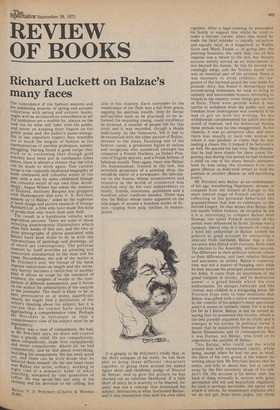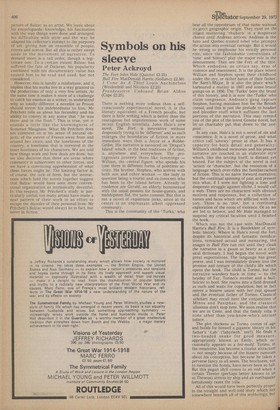Richard Luckett on Ballzac's many faces
The coincidence of the fashion seasons and the publishing seasons, of spring and autumn collections with spring and autumn books, might well be accounted no coincidence at all. For publishers are a modish lot, always on the look out for what will 'take' with the public. and intent on keeping their fingers on the public pulse and the public's purse-strings. But in one important respect they resemble not so much the moguls of fashion as the representatives of another profession, namely smuggling. Having found a good recipe they stick to it, reckoning that though gold watches have been put in toothpaste tubes before, there is always a chance that the trick Ca n be made to work again. One current ' recipe is the copiously illustrated biography of Some celebrated and colourful writer ot the Past, with a text by some celebrated though less colourful writer of our own time. Accordingly, Angus Wilson has taken the measure of Dickens, Anthony Burgess has grappled with Shakespeare and now V. S. Pritchett scluares up to Balzac,' aided by the expertise In book design and picture research of George Rambird Ltd., a firm who have made this kind Of Production very much their own field. The result is a handsome volume with rnairvellous pictures. There are none of those irritating anachronistic illustrations which Often flaw books of this sort, and the two or three photographs of places associated with Balzac have been made to fit in with the reproductions of paintings and drawings, all of which are contemporary. The pictorial element by itself provides an amusing and Instructive introduction to the man and his times, Nevertheless, the nub of the matter is Mr Pritchett's text; the format of the book imposes restrictions on length and the necess,rY brevity becomes a restriction of another kind. It allows no scope for the rehearsal of
evidence, the exegesis of works or the comparison of different assessments, and it forces On the author the arbitrariness of the essayist or the journalist, The result is likely to be, at best, provocative or, at worst, superficial; Ideally we might find a distillation of the writer's thinking about his subject, but it is certain that we cannot have anything
Proaching a comprehensive view. Perhaps wir Pritchett is fortunate in that a e, ornprehensive view of his subject must be an Irnpossibility Balzac was a man of compulsions. He had, as Mr Pritchett says, no more self-control than a greedy child. He ate compulsively, spent compulsively, Made love compulsively and wrote compulsively. Above all, he lied Fonapulsively, and he lied about everything, Including his compulsions. His lies were acted oilt, and there can be little doubt that he behaved them himself. On the one hand there Was Balzac the artist, solitary, working at night clad in a monastic habit of white towelling, sustained by vast quantities of coffee. He was monk-like not only in his clothmg and his devotion to his calling, but also in his chastity. Each surrender to the weaknesses of the flesh was a fall from grace, sapping his spiritual wealth. Only by heroic self-sacrifice such as he practised, so he informed the enquiring young, could excellence be attained. A number of people fell for this story and it was recorded, though a shade maliciously, by the Goncourts. Yet it had to be reconciled with the other picture of Balzac, dressed to the nines, flaunting one of his famous canes, a prominent figure at salons and receptions who numbered amongst his conquests a French Duchess, an Italian Princess of English descent, and a Polish heiress of fabulous wealth. Then again, there was Balzac the businessman, trained in the law, the erstwhile proprietor of a printing shop, the would-be editor of a newspaper, the speculator on the bourse, whose inventiveness and resource in the world of commerce was matched only by his vast indebtedness to family, friends, mistresses, publishers and a hundred other creditors besides. There was also the Balzac whose name appeared on the title-pages of around a hundred works of fiction, ranging from pulp thrillers to masterpieces.
It is greatly to Mr Pritchett's credit that, in the short compass of his study, he has been able to bring these different characters together, to group them around the naked figure short and childishly pudgy of Honord de Balzac, and to give the picture he has blocked out an inherent likelihood. If it falls short of unity he is scarcely to be blamed, for unity was not a concept that interested his subject. Interaction is what fascinated Balzac, and it was interaction that held his own roles together. After a legal training he persuaded his family to support him whilst he tried to make a literary career; when this failed he made the fatal mistake — equally attractive and equally fatal, as it happened, to Walter Scott and Mark Twain — of going into the printing business; the only way out of this impasse was a return to the pen, but literary success merely served as an inducement to live beyond his means. At this he proved exceedingly adept, and the 'literary monk' role was an essential part of the process. Since it was necessary to avoid creditors, the sergeants of the national guard (he was liable for periodic duty, but found it distracting) and second-string mistresses, he took to living in unlikely and inaccessible houses, retreating to friends in the country when things got too hot in Paris. There were periods when it was tactful to withdraw from the public eye, and freedom from interruption was essential if he was to get on with his writing. So his withdrawals complemented his sallies into the world of fashion, and his behaviour during these periods was no less exaggerated, As for chastity, it was an attractive idea, and since there was usually at least one woman to whom it was prudent to claim that he was leading a chaste life, it helped if he believed it as well. He assured his last love, Mme Hanska, that he had been chaste for three years, forgetting that during this period he had fathered a child on one of his many female admirers: here he was using the counters from one game (Balzac as dedicated artist) to hold his position in another (Balzac as self-sacrificing lover).
Mr Pritchett sees Balzac as an embodiment of his age, transferring Napoleonic dreams of conquest from the theatre of Europe to the more limited stage of French society, and reflecting in his personal behaviour the acquisitiveness that was to culminate in the Second Empire. He also shows that Balzac did not merely follow fashion; on occasion he led it. It is interesting to compare Balzac with Dumas, the other French novelist of the period most influenced by Scott. Dumas was a romantic liberal who in a moment of crisis of a kind not unfamiliar to Balzac turned his politics to good account by extracting a sinecure from Garibaldi; Balzac was a conservative who flirted with reaction. Both tried for election to the Assembly, without success. The difference in their political outlook relates to their differences, and their relative failures and successes, as artists. Balzac's conservatism was not a matter of hanging onto what he had, because his principal possessions were his debts. It came from an awareness of the greed rampant in society, and its destructive power — a greed beside which his own enthusiasms, for antique furniture and fine clothes, was childish in a mitigating sense. Mr Pritchett from time to time mentions that Balzac was gifted with a native commonsense. In the context of his subject's more spectaular antics it seems an unlikely claim. Yet it is true (so far as I know, Balzac is not on record as saying that he possessed this faculty, which is the best possible argument for its truth) and it emerges in his novels. In political terms it meant that he instinctively foresaw the era of Baron Haussmann and its consequences. But it was Dumas, not Balzac, who lived on to experience the autumn of Sedan.
This Balzac, who could see the world around him with exceptional clarity, whilst being, except when he had his pen in hand, the slave of his own greed, is the reason for writing about him. Mr Pritchett knows that he exists, and tells us about him, but is carried away by the fine novelistic shape of his subject's life. His account is far better than this kind of thing normally is, written with great perception and wit and beautifully organised. Its fault is perhaps inevitable: the speed with which it moves. Its momentum explains why we do not get, from these pages. any sharp
picture of Balzac as an artist. We learn about his encyclopaedic knowledge, his fascination with the W y things were done and arranged, his difficulties with style and the way he adapted his collector's instinct to the purposes of art. giving him an ensemble of people, events and scenes. But all this is rather swept aside in the movement or narrative, To demand more is a tall order, though a legitimate one. To a certain extent Balzac has suffered the fate of Dickens; his popularity combined with his documentary value has caused him to be read and used, but not considered.
However, this is hardly a misfortune, and it, implies that his works live in a way granted to the productions of only a very few artists. At the same time it makes it more of a challenge to catch his essence as a writer, to understand why so totally different a novelist as Proust should stress his indebtedness to him. Mr Pritchett tells us about his fecundity and his ability to convey in any scene that " he was there and in the flesh." This is true, yet it sounds a little like the knowingness of Somerset Maugham, What Mr Pritchett does not comment on is his sense of natural objects, of the extent of France away from and around her cities, and the loneliness of the country, a loneliness that is mirrored in the inner loneliness of his characters. We are told how things work and how deals are done, but we also discover that there are areas where commerce is subservient to other forces, and we have a convincing apprehension of what these forces might be. The limiting factor is, of course, the lack of form, but the interactions which hold the novels together suggest that Balzac would have seen more conventional organisation as intrinsically deceitful. In this respect, Mr Pritchetes study is particularly usetul; too many artists have made a neat pattern of their work in an effort to escape the disorder of their personal lives. Mr Pritchett's Balzac would always lie in fact, but never in fiction.











































 Previous page
Previous page